The recommended daily dose contains:
- Calcium 400,000 mg
- Magnesium (Magnesium Oxide) 156,000 mg
- Vitamin C 85,000 mg
- Ginger (extract) 60,000 mg
- Nicotinamide (Vitamin B3) 18,000 mg
- Vitamin E (D-alpha-tocopheryl acetate) 11,000 mg
- Vitamin B5 6,010 mg
- Iron (Diferrous Sulphate) 5,000 mg
- Vitamin B6 5,000 mg
- Zinc (Zinc Oxide) 5,000 mg
- Beta-Carotene (Vitamin A) 2,000 mg
- Vitamin B1 1,410 mg
- Vitamin B2 1,400 mg
- Copper 1,000 mg
- Folic acid 0,400 mg
- Iodine (Sodium Iodide) 0,150 mg
- Molybdenum 0,080 mg
- Selenium (from selenium yeast) 0,030 mg
- Vitamin K1 0,006 mg
- Biotin (Vitamin B7) 0,004 mg
- Vitamin B12 0,002 mg
Calcium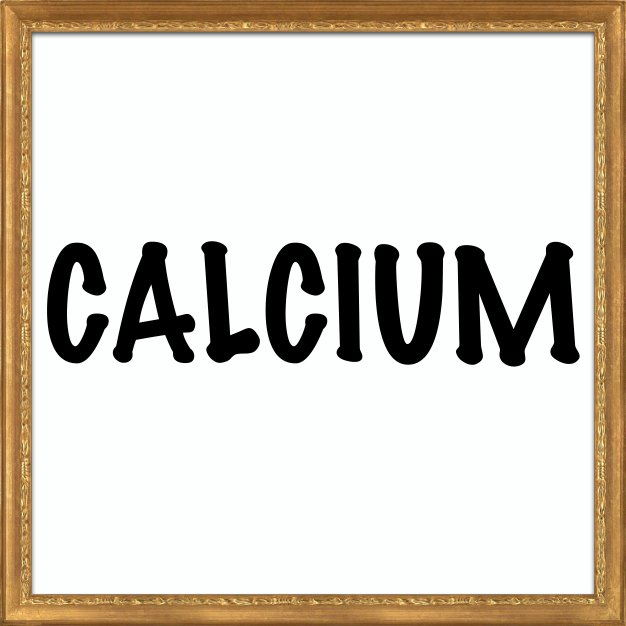
Calcium is the most abundant mineral in the human body, being 99% in the bones and teeth where it plays a structural role. Its deficiency in children leads to rickets, and in adults to softening of the bones and osteoporosis (loss of calcium from the bones and thinning of their density, which causes them to be fragile and prone to breaking). A decrease in bone calcium occurs with age in all individuals, and is greatest in women during menopause.
|
Magnesium (Magnesium Oxide)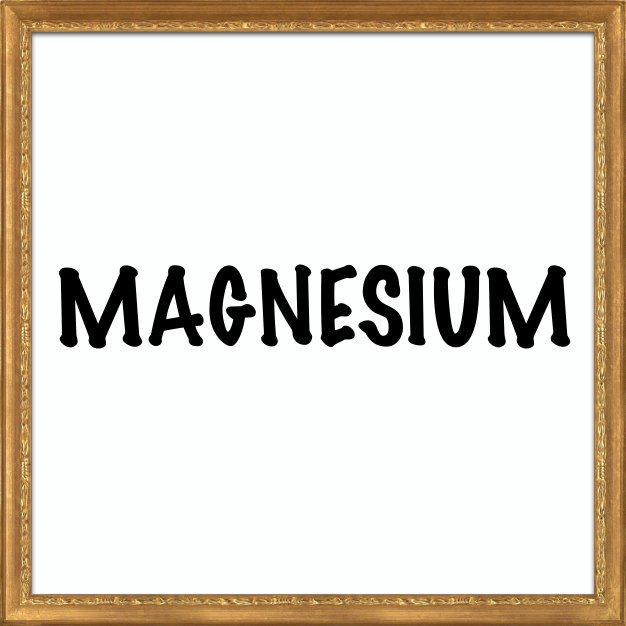
Magnesium oxide is also specifically used to support a healthy gastrointestinal system.
After calcium, magnesium is the second mineral that is essential for the formation of bones and teeth. For muscles, it plays an important role as an electrolyte for nerve impulses and thus supports their function. As magnesium is particularly important for muscle function, its deficiency manifests itself, for example, in sports as muscle tremors or spasms.
Magnesium is also lost with the body's sweat, which is why it is recommended during prolonged exertion to pay attention to regular intake of magnesium. Muscle tension that causes back and neck problems can also result from magnesium deficiency. If the deficiency is permanent, the stability of bones and teeth can be affected, as well as the course of enzyme-dependent processes in the body. Especially people with gastrointestinal problems may suffer from magnesium deficiency. To burn fat, our body needs more magnesium than the normal daily dose. Magnesium is also necessary for the formation of a number of important enzymes.
|
Vitamin C
When it comes to colds, vitamin C is on everyone's lips - literally, because it provides valuable support for the immune system. Equally important is its effect as an antioxidant: vitamin C, just like vitamins A and E, neutralizes free radicals that can damage cells in our body. Vitamin C is involved in the production of endogenous collagen and controls the production of L-carnitine. It also plays an important role in the development of teeth, gums, muscles and bones, as well as in burning fat. Since vitamin C helps the absorption of iron, it has a beneficial effect on the oxygen content of the blood. Vitamin C deficiency can be manifested by frequent and prolonged infections and colds. Its absence affects our general well-being and our ability to work. Because of its central role in the formation of connective tissue, the lack of vitamin C also has a negative effect on the structure and health of the skin. Fresh fruits and vegetables with universal vitamin C should be present in our menu every day. The most famous suppliers of vitamin C are of course citrus fruits. Vitamin C, which is also known as ascorbic acid, greatly contributes to their fresh taste. The unsung heroes when it comes to vitamin C, however, are potatoes, which are also high in ascorbic acid. Both broccoli and peppers have more vitamin C than the classic orange. But a person cannot always carefully compose his daily menu. In addition, many people have an increased need for vitamin C, such as smokers or athletes, as well as people who are under daily stress. Dietary supplements can provide in these cases an adequate supply of vitamin C. Vitamin C lowers the pH of the urine and thus helps to reduce the bacteria in the urinary tract that are not resistant to acid. Vitamin C is important for biosynthesis and supports detoxification processes in the body. It is also involved in iron metabolism. Vitamin C also stimulates the production of norepinephrine and supports the conversion of fat into energy. With this, vitamin C is an active dietary supplement for burning fat. Some nutritionists recommend up to 1 gram of vitamin C per day at the start of a weight loss diet.
|
Ginger (extract)
The aroma of ginger (Zingiber officinale) is pleasant, the taste is spicy to hot. The ginger root contains a viscous balsam (Oleoresin) of essential oils and a hot component - gingerols and shoagols. Powdered ginger root has antioxidant and anti-inflammatory properties.
It is used as an anti-nausea and vomiting agent and has a stimulating effect on gastric juice, saliva, the formation of bile juice, as well as the functioning of the intestines. The spicy ingredients also have a positive effect on the well-known travel sickness or seasickness.
|
Nicotinamide (Vitamin B3)
Nicotinamide (Vitamin B3) helps, together with other B vitamins, for the smooth functioning of the metabolism. It is important for skin, nerves and cell nuclei. Vitamin B3 gives more endurance during training, more energy and helps muscle growth. The body can obtain the vitamin through food or produce it from the amino acid tryptophan. Vitamin B3 is stored in the liver, so supplies usually last four to six weeks. However, a lack can occur as a result of an unbalanced diet or illness. Sunburn-like skin changes, diarrhea and loss of concentration may be the first signs of this. A balanced diet that contains all B vitamins is recommended. With dietary supplements containing vitamin B3, you can also compensate for any deficiency. B vitamins are known as "brain food". Almost all of them are soluble in water and for this reason must be taken constantly, as they do not stay in the body.
|
Vitamin E (D-alpha-tocopheryl acetate)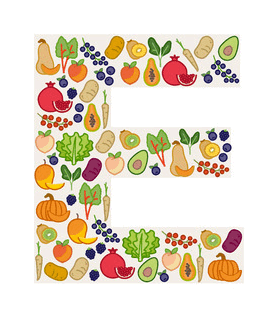
Vitamin E is best known as a fat-soluble "free radical scavenger." Just like vitamins A and C, it protects the body's cells against aggressive oxygen compounds and toxins in the environment. Vitamin E can thus delay premature aging and prevent cell damage leading to disease or even cell degeneration. Due to its protective effect, vitamin E, which in the language of chemistry is called D-alpha-tocopheryl acetate, is widely used in cosmetics. It also plays an important role in protein and fat metabolism. Vitamin E supports the functioning of the cardiovascular system in two ways. First, it helps reduce "bad" cholesterol, and thus has a positive effect on blood vessels. Second, it prevents red blood cells from sticking together and thus improves blood circulation. Since vitamin E also has an anti-inflammatory effect, it can help relieve rheumatic pain. Vitamin E is formed exclusively in plants and starts from there along the food chain. Signs of vitamin E deficiency are skin problems, muscle weakness, degeneration and a higher susceptibility to infections. Supplementing the daily diet with vitamin E can be conveniently and easily implemented through nutritional supplements.
|
Vitamin B5
Vitamin B5 is also known as pantothenic acid and is found in almost all foods. Vitamin B5 is essential for the production of coenzyme A, which in turn is necessary for the metabolism of carbohydrates, proteins and fats. Thus, Vitamin B5 plays, like all B vitamins, an important role in supplying the body with energy. Vitamin B5 also supports the protective function of the mucous membranes. Vitamin B5 is also beneficial for the skin and even more so for the hair, whose growth and pigmentation it supports. Lack of vitamin B5 is rare because it is found in abundance. However, a deficiency can occur, for example, in people who suffer from intestinal diseases. Anemia, a weak immune system, and numb or burning legs and feet can be a sign of this.
|
Iron (Diferrous Sulphate)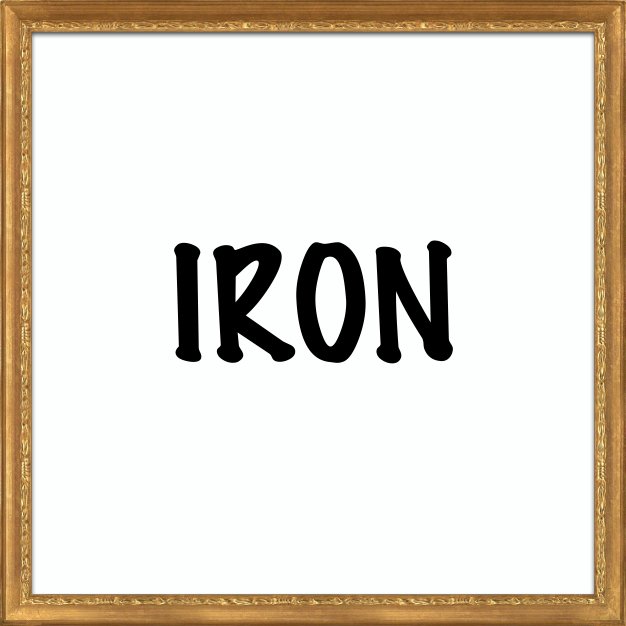
Iron is responsible for many processes in the body. For example, it supports the supply of tissues with oxygen and stimulates metabolism. Iron is also a necessary mineral for the growth, development and normal functioning of cells, as well as for the synthesis of some hormones and for connective tissue.
Supplemental iron intake is especially recommended for anemia or low red blood cell levels. Iron tones the body and helps to reduce the symptoms of fatigue.
|
Vitamin B6
The body needs vitamin B6 (also called pyridoxine) to convert amino acids from food into its own proteins. Vitamin B6 thus makes an important contribution to metabolism. In addition, vitamin B6 is involved in the development of red blood cells, which supply the body with oxygen. Even the immune and nervous systems are affected by vitamin B6. For example, vitamin B6 is necessary for the formation of the "hormone of happiness" serotonin. Fatigue, insomnia and nervousness can be symptoms of a weakening of the nervous system, which is based on the lack of vitamin B6. Even with a strong immune defense, vitamin B6 deficiency can have a negative impact. Changes or inflammation of the oral mucosa or the corners of the mouth may occur. Vitamin B6 is found in relatively many foods - especially meat, whole grains, potatoes, various vegetables, bananas and avocados. Nevertheless, a mild deficiency is not uncommon. A particularly protein-rich diet increases the need for vitamin B6. Preparations containing vitamin B6 can easily supplement the daily nutritional intake. This vitamin is responsible for the normal content of magnesium in the body, brain activity and muscle activity. It is also necessary for the formation of red blood cells.
|
Zinc (Zinc Oxide)
Besides iron, zinc is the most abundant trace element in the body. Zinc is an important component for over 200 enzymes and affects metabolism. It supports, for example, the body's supply of energy, growth and the production of sex hormones. Zinc also strengthens the immune system and can help prevent infections and heal faster. A good supplier of zinc are some cheeses such as Edam. Many whole grains also contain high amounts of zinc. Oats and wheat germ are some of the best suppliers of the trace element. A little luxury can also help your zinc supply, because oysters are the No. 1 zinc-rich food. Even just one oyster on the menu covers the daily requirement more than enough. In general, zinc is also found in significant concentrations in meat, fish and legumes. Although zinc is found in many foods, Germany tends to be slightly deficient. Due to the wide-ranging tasks of zinc in the body, the signs of deficiency are varied: fatigue, lowered immunity, difficult wound healing, lesions in the mouth, changes in taste perception, night blindness and delayed hair and nail growth may be signs of zinc deficiency . There is a wide range of zinc-containing products on the market that can be used to compensate for a deficiency. Zinc oxide is also needed to regulate blood sugar levels.
|
Beta-Carotene (Vitamin A)
Beta-carotene (Vitamin A) is a powerful antioxidant. It is important for the eyes and as a component of the visual pigment rhodopsin is responsible for twilight vision. It is necessary to maintain good health. As a strong antioxidant, beta carotene protects the body from the harmful effects of free radicals.
|
Vitamin B1
Vitamin B1 plays an important role in the proper functioning of muscles and nerves. Like other B vitamins, it also participates in cellular metabolic processes. It helps the body as a coenzyme to get energy from carbohydrates and fats and thus affects memory performance. Poor memory or fatigue may be a sign of a lack of vitamin B1, of which the human body can only accumulate small reserves. Heavy physical exertion can increase the likelihood of a deficiency of this vitamin, because carbohydrate metabolism is enhanced. Although a slight deficiency of vitamin B1 often occurs in developed countries, in practice the disease "beri-beri" has already disappeared. It is caused by an acute deficiency of vitamin B1 and seriously damages the nerves and muscles. Cereals contain a lot of vitamin B1. However, hulled beans are usually used for food production. The coats of seeds and sprouts with their high vitamin B1 content are lost during peeling. For a better supply of vitamin B1, it is good to include legumes such as lentils or soybeans in the menu. Pork and liver also contain large amounts of vitamin B1. Widespread vitamin B1 deficiency can be prevented with appropriate nutritional supplementation. This vitamin is essential for the metabolism of carbohydrates, for the flow of nerve impulses and for the normal functioning of muscles, and is also involved in the construction of nerve tissue.
|
Vitamin B2
Vitamin B2 plays a central role in metabolism. It supports the conversion of carbohydrates, proteins and fats into energy. Vitamin B2 also plays an important role in the conversion of nutrients into fatty acids and endogenous proteins. It also supports the function of vitamins B6 and niacin (B3). Also known as riboflavin or vitamin B2 lactoflavin, it is mostly found in dairy products. But meat, wholemeal bread and some mushrooms are also good sources of vitamin B2. In cultures where corn is one of the staple foods, vitamin B2 deficiency occurs because corn is poor in it. Inflammation of the oral mucosa, cracked corners of the mouth or growth problems may be signs of vitamin B2 deficiency. In this case, the diet can be supplemented with appropriate preparations. This vitamin is responsible for the normal growth of the body and for supplying the cells with energy.
|
Copper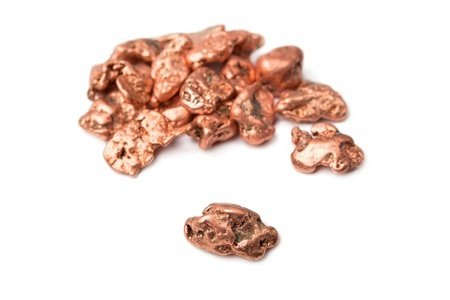
Copper is an important mineral that is involved in many biochemical reactions in cells. It is necessary for the transformation of iron into hemoglobin. Extremely useful in the fight against macular degeneration. New studies suggest that it may have a positive effect on the prevention of Alzheimer's.
|
Folic acid
Vitamin B9 is much better known by the chemical name "folic acid". Like all vitamins of the group, folic acid supports the metabolism of substances and energy of the cells of the body. In addition, folic acid performs important functions in cell division and cell growth. The building of genetic material, red blood cells and muscles function smoothly with only folic acid. Anemia, skin changes and difficult wound healing can be manifestations of a lack of folic acid or vitamin B9. During pregnancy, consistent coverage of daily needs is generally recommended, as abnormalities in unborn babies are associated with a lack of folic acid. Folic acid can have a positive effect on blood vessels, and therefore there should be enough of it in case of cardiovascular diseases. Vegetables are a valuable supplier of folic acid. Especially spinach, cabbage, broccoli and tomatoes contain a lot of it. But also whole grains, eggs, wheat germ and soy products contribute to an adequate supply of folic acid. Depending on the particular food product, the absorption of folic acid in the intestine differs. Folic acid deficiency is more common than previously thought. Folic acid supplements can be a useful addition to food. Folic acid increases appetite, is effective against anemia and protects against birth defects, parasites in the digestive system and food poisoning. It provides a good texture to the skin and acts as an analgesic to relieve pain. It also improves the production of breast milk and counteracts the loss of hair color.
|
Iodine (Sodium Iodide)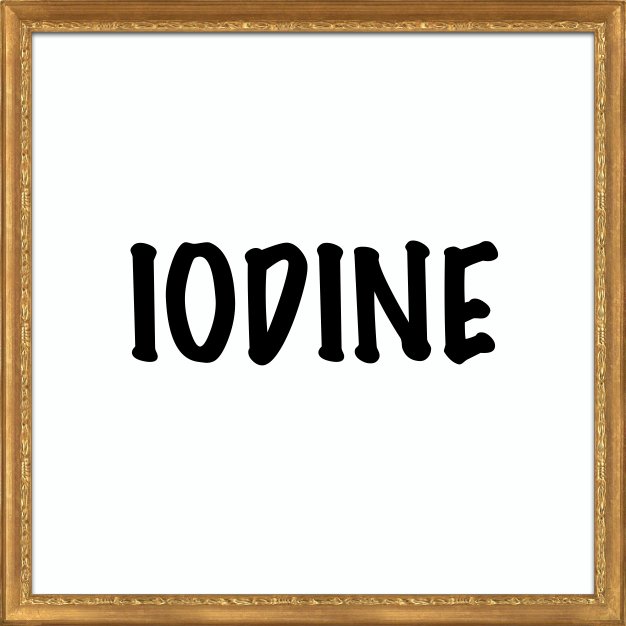
Iodine (Sodium Iodide) is one of the main components of thyroid hormones. A sufficient amount of iodine in the body is of particular importance for the regulation of many biochemical reactions, including protein synthesis and enzyme activity, as well as for stimulating metabolism. Iodine deficiency could cause problems in skeletal and central nervous system development in fetuses and young children, which is why supplementary intake during pregnancy and breastfeeding is recommended.
|
Molybdenum
Molybdenum (Sodium molybdate) is a trace element found naturally in the human body, particularly in the liver, kidneys, glands and bones. The availability of Molybdenum in the body supports the work of the liver and has a positive effect on fungal infections, allergies, asthma, acne, eczema, anemia, insomnia, osteoporosis, to improve libido and others. Molybdenum deficiency in the body is a relatively rare phenomenon that predisposes to the development of fungi and impairs the body's ability to fight free radicals.
|
Selenium (from selenium yeast)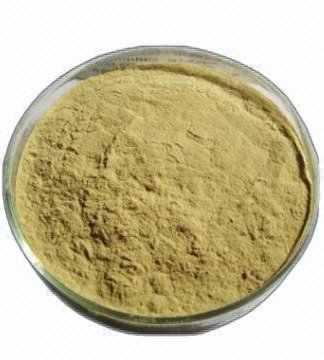
Selenium is one of the most important trace elements necessary for our body. It is a co-factor in a number of enzymes that protect cells from the toxic action of peroxide radicals. This determines its antioxidant effect. In recent years, selenium deficiency has been considered as a possible etiological factor in some cardiovascular diseases, which is caused by the destruction of cell membranes by free radicals in selenium deficiency. It reduces the risk of cancer. It facilitates the removal of heavy metals from the body, including cadmium and arsenic, so it is necessary for smokers and residents of large cities. It slows down the aging of tissues, including the skin, making it smooth and tight. It is also important for eye health. In menopausal women, it relieves attacks of hot and cold flashes. When used simultaneously with vitamin E and provitamin A (beta carotene), they mutually enhance their effect.
|
Vitamin K1
Vitamin K is key to blood clotting, limiting bleeding and preventing excessive bleeding. Cases of vitamin K deficiency are relatively rare in adults, but quite common in infants and children. Normally, the body is sufficiently supplied with vitamin K with a varied diet. Additional intake of vitamin K is recommended for pregnant women, nursing mothers, athletes, people with absorption problems, with anemia, alcohol abuse and others. Vitamin K1 is the preferred form of vitamin K because it is non-toxic, faster acting and stronger. Vitamin K1 also helps to normalize blood sugar levels.
|
Biotin (Vitamin B7)
Biotin (vitamin B7 or less commonly vitamin H), like all vitamins of the B complex, is necessary for the smooth running of the metabolism. During the construction and breakdown of fatty acids, it plays an important role as a coenzyme. Biotin is known for its beneficial effects on the health and beauty of the skin, hair and nails. Flaky skin, brittle nails and hair, hair loss and a weakened immune system - these may be the first signs of biotin deficiency. Smokers, athletes, pregnant and lactating women and people who often drink alcohol should pay attention to a sufficient supply of biotin. Restores damaged and exhausted hair by hydrating and nourishing it from the inside. It helps stop hair loss by strengthening the connection between the hair root and the scalp. Reduces dandruff by actively hydrating and nourishing the scalp. Visibly accelerates hair growth. The hair is strong, elastic and more resistant to the harmful effects of a hair dryer, treatment with preparations, cold and wind, sun, etc. Biotin also strengthens soft, brittle and peeling nails, accelerates their growth and improves their appearance. It makes the skin elastic, deeply hydrated and nourished. It also slows down aging and the appearance of wrinkles and overall improves the condition of the epidermis. The skin regenerates faster and acquires a younger and more vibrant appearance. Improves blood circulation.
Good sources of biotin are liver, meat, soy products, egg yolk, nuts, oats, spinach, mushrooms and lentils. In addition, biotin is also produced in small amounts by bacteria in the gut.
|
Vitamin B12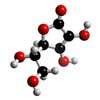
Vitamin B12 is only needed in small amounts, but plays an important role in cell division and cell growth. Vitamin B12 is also essential for the formation of red blood cells. Like the vitamin folic acid, it can serve to stop the progression of atherosclerosis and thus prevent cardiovascular disease. The immune and nervous systems are also strengthened by vitamin B12. Like all other B vitamins, vitamin B12 is involved in cellular metabolism. Vitamin B12 is found almost exclusively and only in animal foods such as meat, dairy products and eggs. Microbially fermented plant foods such as sauerkraut also contain vitamin B12. One of the few plant-based suppliers of vitamin B12 is sea buckthorn. However, there is controversy over whether "plant" vitamin B12 can be used by the body. In a balanced diet that includes meat, eggs or dairy products, the need for vitamin B12 is generally met. People who maintain a strict vegetarian or vegan diet and do not consume any animal foods often suffer from vitamin B12 deficiency. In stomach and intestinal diseases associated with the lack of stomach acid, the absorption of vitamin B12 can be impaired. A lack of vitamin B12 is manifested by physical exhaustion, memory problems and in extreme cases - permanent nerve damage. To ensure an adequate supply of vitamin B12, it can be taken additionally with dietary supplements. This vitamin is absolutely necessary for the formation of red blood cells, for cell renewal, for muscle building and for the normal growth and normal functioning of the nervous system.
|




There are no reviews yet.